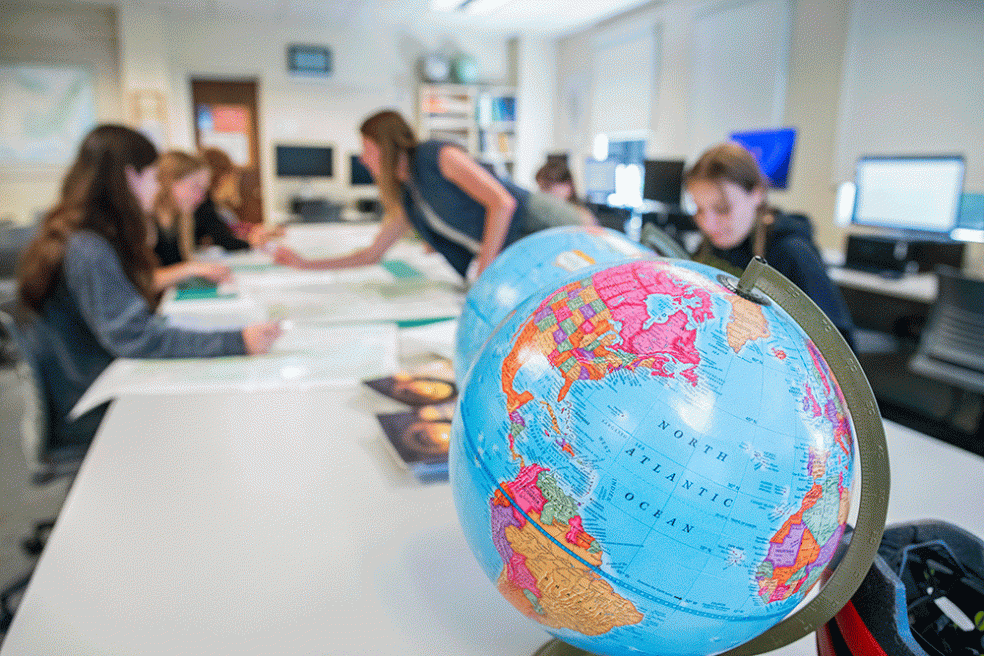
The degree is one of 11 new programs launching this fall as part of the University’s academic polytech buildout.
This program represents the future of learning, says program director Rebecca Robertson. “Students’ ability to combine coursework from different disciplines prepares them to meet the interdisciplinary demands of the 21st century workforce, and the needs of living in a globalized society. As they explore and bridge gaps between fields, they develop the ability to synthesize ideas, tackle complex problems, and communicate effectively across differences.”
The program invites students to be collaborators in the design of their own learning, and fuse multiple areas of study to forge a unique path. If a student is interested in business psychology, for example, they can unify those interests into a degree that incorporates courses in business and psychology. Other examples include game design, ethnobotany, applied ethics, or community development.
The possibilities are endless, says Robertson.
The program’s goal is to provide students with a flexible, innovative, and customized education. With in-person, hybrid, and online pathways, the IDP program serves students’ needs and schedules—especially those with robust life responsibilities, or those who cannot attend on-campus classes.
Hannah Kolkmannm is combining her passions for healthcare and gender studies while completing her B.A. online. This allows her to live at home in Mendocino County where she can help her family without putting her degree on hold.
Her degree plan encompasses courses in health education, psychology, and women's studies—topics that spark her interest and make her want to learn. Kolkmann plans to attend medical or nursing school; knowledge in these different fields will make holistic, empathic, and empowering interactions with patients easier, she says.
“One needs to look at the entire person when providing medical care; intertwining health sciences and psychology will provide me with tools to better acknowledge the entire person,” she explains. “Incorporating women's and gender studies will allow me to better address each patient's unique experiences and provide them with the care they need and deserve.”
For Aubrey Sabre, the IDP is liberating and creative. Pursuing it allows her to better care for herself, and in turn, her community.
“I wish to step away from the standard workplace and career narratives,” she explains. “I want to develop my own schedule and job title that allows me flexibility to prioritize my child, dogs, joys, and self-care practices, and have the job that I create for myself with a team that supports me in supporting myself. In the end it will offer me more energy to give back into the community.”
When Aubrey, who completed her associate degree in Fine Arts from College of the Redwoods this spring, realized that Cal Poly Humboldt will begin offering the IDP this fall, it was serendipitous.
Sabre is fusing her passions for art, plants, and community organizing into a career in community event planning and sustainable living practices. Her current pathway will include courses in business, botany, and art, she says.
Although these are traditionally seen as different fields, Sabre considers them symbiotic. “You cannot have one without the other.”
Many careers are at the intersection of different disciplines, Robertson explains. Acquiring interdisciplinary habits of mind and skills enables students to take advantage of evolving employment opportunities, which proves valuable for younger generations.
Research shows that younger generations are more likely to explore different jobs. “A whopping 75% of Gen Zers say they're willing to switch career paths entirely and look for jobs in new industries,” according to an Axios report.
In addition to career flexibility, the program also prepares students for jobs in emerging industries like renewable energy, user experience research, or sustainable design, Robertson adds.
Employers also value exposure to a variety of disciplines, adaptability, digital literacy, and critical thinking skills, according to the Association of American Colleges and Universities.
Cal Poly Humboldt’s IDP emphasizes these skills through a core set of three classes—interdisciplinary communication, inquiry, and a capstone project. These courses focus on helping students integrate their multi-disciplinary coursework while building digital communication, research and analysis, strategic planning, problem solving, and project management skills, explains Robertson.
Aside from core courses, students can incorporate experiential learning and internships into their degree plan. They will work closely with faculty and advisors along the way to build their degrees. The University is also working with local community colleges to complete an IDP pathway program.